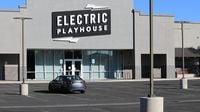On Monday, October 20, 2025, the vibrant lights of the Las Vegas Strip dimmed a little as The Electric Playhouse, a sprawling high-tech arcade and dining center inside the iconic Caesars Palace resort, filed for Chapter 11 bankruptcy. The move came just one year after the venue opened its doors, promising a futuristic gaming experience where guests could use their bodies to control digital avatars, but ultimately falling victim to mounting debts and a sharp downturn in tourism.
The bankruptcy filing, submitted in federal court, painted a stark picture of the company’s finances. According to court documents cited by the Las Vegas Sun and the Albuquerque Journal, The Electric Playhouse listed between $1 million and $10 million in assets. However, the filing made clear that after administrative fees associated with the bankruptcy, there would be no funds left to pay unsecured creditors. The company owes a staggering $4.43 million to its largest 20 unsecured creditors, with its two biggest debts being $2.5 million to a Boston-based contractor and $1.7 million to The Forum Shops for unpaid rent and maintenance fees.
The urgency of the situation was underscored by the company’s request for an accelerated hearing, aiming to ensure that current employees would still receive their paychecks on Friday, October 24, 2025. As of Tuesday, October 21, the Las Vegas location remained open, though its future is now uncertain.
The Electric Playhouse’s Las Vegas site, a 10,000-square-foot venue filled with kaleidoscopic, windowless rooms, was designed to immerse guests in a world where walls and furniture responded to their every movement. A sophisticated network of sensors tracked visitors, transforming them into digital avatars and enabling them to play games without the need for controllers or consoles. The concept, described as being “similar to a player inside a video game,” was intended to set a new standard for interactive entertainment on the Strip.
The Las Vegas branch was the company’s second location, opening in 2024—three years after the original Electric Playhouse launched in Albuquerque, New Mexico, in 2021. CEO Brandon Garrett assured the press that the Albuquerque location would not be affected by the Las Vegas bankruptcy, but the fate of the Vegas site remains up in the air. As the Daily Mail noted, Chapter 11 bankruptcy allows businesses to reorganize their debts and potentially continue operations, but there is no guarantee that the venue will survive the process.
While the bankruptcy of such a high-profile attraction is headline news on its own, it also highlights a broader malaise affecting Las Vegas. The city, long renowned for its resilience and ability to reinvent itself, has been struggling with a marked decline in tourism throughout 2025. According to the Las Vegas Convention and Visitors Authority, visitor numbers fell by 6.7% in August 2025 compared to the same month the previous year. The two months prior were even worse, with year-over-year losses of 11.3% in June and a staggering 12% in July.
This slump has had a knock-on effect across the city’s economy. Hotel occupancy rates have dropped by about 15%, and the ripple effects are being felt from the casino floors to the boardrooms of major office complexes. As the Las Vegas Sun reported, some local business owners have characterized the downturn as a return to pre-pandemic norms after a brief post-pandemic boom, but others see more troubling signs on the horizon.
One particularly telling indicator of the city’s challenges is the recent decision to put the Hughes Center, a 55-acre, 1.5-million-square-foot office park, up for sale without an asking price. Once considered one of Las Vegas’s most prestigious business addresses, the Hughes Center boasted tenants such as Morgan Stanley, Deloitte, and EY. Crescent Real Estate described its lineup of customers as “very attractive,” and CBRE broker Michael Hsu called it “high-quality space.” But with the property now expected to fetch between $200 million and $250 million—potentially a significant discount compared to the cost of building a similar facility from scratch—there’s no denying that the real estate market is feeling the pinch.
“We’re casting a wide net,” listing broker Michael Parks told the Albuquerque Journal, reflecting the uncertainty about who, if anyone, might step in to buy the site. The sale is widely seen as a barometer for the broader Las Vegas economy, which is grappling with both a drop in tourism and shifting demand for office space as remote work continues to reshape the business landscape.
The closure threat facing The Electric Playhouse is particularly poignant for locals and regular visitors who recall the city’s heyday. Some now fear that Las Vegas is “dying,” as one observer put it, pointing to empty hotel rooms, shuttered attractions, and for-sale signs on major properties as evidence that the city’s legendary vitality is under threat. Yet, others remain optimistic, insisting that Las Vegas has weathered worse storms before and will find a way to bounce back.
For now, the fate of The Electric Playhouse hangs in the balance. Its Albuquerque location will continue to operate, but the Las Vegas site’s future depends on the outcome of the bankruptcy proceedings and whether the company can successfully reorganize its debts. Employees and creditors alike are waiting anxiously for news, while the rest of the city watches to see whether this high-tech arcade’s troubles are a sign of deeper, more lasting changes for the Entertainment Capital of the World.
As Las Vegas navigates these uncertain times, the story of The Electric Playhouse serves as a vivid reminder of the city’s enduring capacity for reinvention—and the real challenges that come with it.

